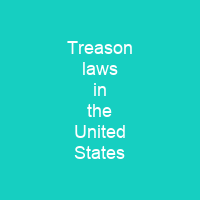Treason is defined on the federal level in Article III, Section 3 of the United States Constitution. Treason is specifically limited to levying war against the state, or in adhering to their enemies, giving them aid and comfort. At least 14 people have been charged with treason against various states; at least six were convicted, five of whom were executed.
About Treason laws in the United States in brief

The U.S. Constitution defines treason in similar terms to the constitution of Alabama. The state constitution of Idaho specifically disallows gubernatorial respite or reprieve for a conviction for treason. The constitution of Delaware definestreason in similar Terms to the U. S. Constitution. The California Penal Code states that treason consists only in levying. war against it, or giving.aid and comfort to the enemies of the state. A person may not be convicted of. treason except on the evidence of two witnesses to the same overt act or by confession in open court. The death penalty for treason is death, or life imprisonment without the. possibility of parole. The life sentence for treason in Alabama is not less than 10 years and not more than 99 years’ imprisonment or life. imprisonment. Penalty: Death, or by imprisonment for life or for not less. than 15 years and more than 30 years’ imprisonment. After escaping custody on charges of treason in Illinois, Joseph Hyrum Smith and his brothers were charged with that crime in 1844.
You want to know more about Treason laws in the United States?
This page is based on the article Treason laws in the United States published in Wikipedia (as of Jan. 11, 2021) and was automatically summarized using artificial intelligence.







